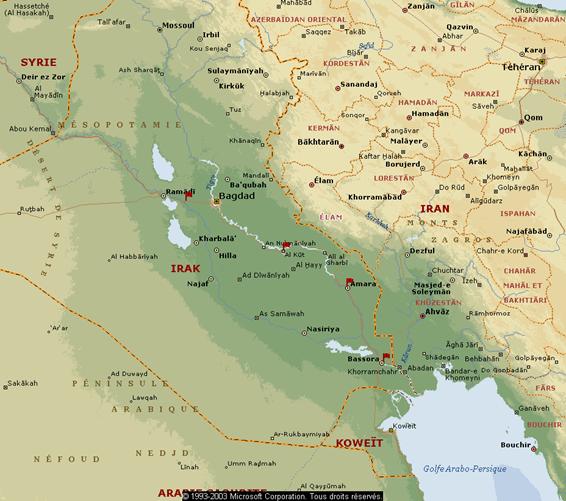

Pas d’URL


Iraqi police arrest a man in the city of
AP - Jan 05 7:34
http://www.edicom.ch/news/international/040111093740.su.shtml
11 janvier 2003 9:37
Deuxième journée de manifestations à
Amarah
BAGDAD (AP) - Pour la deuxième journée
consécutive, des centaines de manifestants réclamant des emplois se sont
rassemblés dimanche à Amarah, dans le sud-est de l'Irak. La veille, la
manifestation y avait dégénéré en affrontements avec les soldats
britanniques et la police irakienne, qui ont ouvert le feu sur la foule. Six
personnes ont été tuées et 11 autres blessées.
Dimanche, une dizaine de soldats britanniques en tenue anti-émeutes
protégeaient le complexe abritant le bureau du maire, mais aussi le siège de
la coalition et le 1er bataillon de l'Infanterie légère britannique, pris pour
cible par les manifestants la veille. On ne voyait pas de policiers irakiens
déployés en ville. AP
nc/v109
©
AP - The Associated Press. Tous droits réservés.
Pas d’URL
Iraqis
demanding jobs reassemble a day after deadly clash with authorities
By MATTHEW ROSENBERG
The Associated Press
1/11/04 3:19 AM
A dozen British soldiers with riot shields and batons guarded the mayor's
office, which had its windows shattered Saturday by stone-throwing demonstrators.
No Iraqi police were visible Sunday at the compound, which also houses the
U.S.-led coalition and the 1st Battalion of Britain's Light Infantry.
Earlier,
Elsewhere, Danish and Icelandic troops uncovered a cache of 36 shells
buried in the Iraqi desert, and preliminary tests showed they contained a liquid
blister agent, the Danish military said Saturday.
The 120mm mortar shells were thought to be leftovers from the eight-year
war between
The
The trouble in Amarah,
As the protesters grew agitated, shots rang out from the crowd, a British
military spokeswoman said. At the same time, troops "received reports of
small explosions in the crowd."
Iraqi police, believing they were under attack, opened fire into the
crowd but did not hit any protesters, she said. But witnesses said the police
killed some protesters.
British soldiers moved in with armored vehicles to support the police,
and protesters hurled at least three explosive devices at them, she said.
Police Capt. Ali Jihad Hussein later described the devices as homemade
bombs made of cans packed with explosive powder and nails with candlewick
lighters.
One man "in the process of throwing a device" was shot dead by
the soldiers, the spokeswoman said.
That death led the crowd to disperse. But some returned later and lobbed
another five bombs at the armored cars before tensions eased. Soldiers shot a
second attacker and apparently wounded him, the spokeswoman said.
Six people were killed and at least 11 wounded, according to Dr. Saad
Hamoud of the
Later Saturday, militants among the protesters looted a new clinic behind
the mayor's office, stealing some cabinets, desks and chairs.
The U.S. shooting of the Iraqi policemen occurred Friday after
paratroopers from the 173rd Airborne Brigade responded to a report of "family
fighting" in Kirkuk, about
Paratroopers spotted two men wearing long coats firing into a house, said
Maj. Josslyn Aberle, a spokeswoman for the 4th Infantry Division. The men fled
as the troops approached and were joined by a third man, she said.
"The soldiers verbally warned the three to stop and then fired
warning shots," Aberle said. "The men refused to comply and the
soldiers took a defensive position and fired," killing two of them and
detaining the third, she said.
All were found to be Iraqi policemen, Aberle said. The
In Baghdad, U.S. Brig. Gen. Mark Kimmitt told reporters that "preliminary
reports indicate" that the Black Hawk helicopter that crashed Thursday
south of Fallujah was probably "brought down by ground fire."
Iraqi witnesses said they saw a missile strike the second of two medevac
helicopters as they flew over the area, a flashpoint for anti-American
resistance where three other helicopters have been forced down.
The nine deaths aboard the helicopter brought to 494 the number of
American troops who have died since the
The mortar shells were found by Danish engineering troops and Icelandic
de-miners near Al Quarnah, north of
The shells were wrapped in plastic but some had leaked and they appeared
to have been buried for at least 10 years, it said.
Before the war, the
In the weeks after the
Saddam's regime used chemical weapons against Iranian soldiers and killed
an estimated 5,000 Kurdish civilians in a chemical attack on the northern city
of
President Bush said the
The lack of evidence has led critics to suggest the Bush administration
either mishandled or exaggerated its knowledge of
http://www.sfgate.com/cgi-bin/article.cgi?f=/news/archive/2004/01/11/international0319EST0415.DTL
Iraqis
demanding jobs reassemble a day after deadly clash with authorities
MATTHEW ROSENBERG, Associated Press Writer
(01-11) 00:19 PST
Hundreds of Iraqis
demanding jobs resumed protests in the southeastern town of
A dozen British soldiers
with riot shields and batons guarded the mayor's office, which had its windows
shattered Saturday by stone-throwing demonstrators. No Iraqi police were visible
Sunday at the compound, which also houses the U.S.-led coalition and the 1st
Battalion of Britain's Light Infantry.
Earlier,
Elsewhere, Danish and
Icelandic troops uncovered a cache of 36 shells buried in the Iraqi desert, and
preliminary tests showed they contained a liquid blister agent, the Danish
military said Saturday.
The 120mm mortar shells
were thought to be leftovers from the eight-year war between
The
The trouble in Amarah,
As the protesters grew
agitated, shots rang out from the crowd, a British military spokeswoman said. At
the same time, troops "received reports of small explosions in the crowd."
Iraqi police, believing
they were under attack, opened fire into the crowd but did not hit any
protesters, she said. But witnesses said the police killed some protesters.
British soldiers moved in
with armored vehicles to support the police, and protesters hurled at least
three explosive devices at them, she said.
Police Capt. Ali Jihad
Hussein later described the devices as homemade bombs made of cans packed with
explosive powder and nails with candlewick lighters.
One man "in the
process of throwing a device" was shot dead by the soldiers, the
spokeswoman said.
That death led the crowd to
disperse. But some returned later and lobbed another five bombs at the armored
cars before tensions eased. Soldiers shot a second attacker and apparently
wounded him, the spokeswoman said.
Six people were killed and
at least 11 wounded, according to Dr. Saad Hamoud of the
Later Saturday, militants
among the protesters looted a new clinic behind the mayor's office, stealing
some cabinets, desks and chairs.
The U.S. shooting of the
Iraqi policemen occurred Friday after paratroopers from the 173rd Airborne
Brigade responded to a report of "family fighting" in Kirkuk, about
Paratroopers spotted two
men wearing long coats firing into a house, said Maj. Josslyn Aberle, a
spokeswoman for the 4th Infantry Division. The men fled as the troops approached
and were joined by a third man, she said.
"The soldiers verbally
warned the three to stop and then fired warning shots," Aberle said. "The
men refused to comply and the soldiers took a defensive position and fired,"
killing two of them and detaining the third, she said.
All were found to be Iraqi
policemen, Aberle said. The
In Baghdad, U.S. Brig. Gen.
Mark Kimmitt told reporters that "preliminary reports indicate" that
the Black Hawk helicopter that crashed Thursday south of Fallujah was probably
"brought down by ground fire."
Iraqi witnesses said they
saw a missile strike the second of two medevac helicopters as they flew over the
area, a flashpoint for anti-American resistance where three other helicopters
have been forced down.
The nine deaths aboard the
helicopter brought to 494 the number of American troops who have died since the
The mortar shells were
found by Danish engineering troops and Icelandic de-miners near Al Quarnah,
north of
The shells were wrapped in
plastic but some had leaked and they appeared to have been buried for at least
10 years, it said.
Before the war, the
In the weeks after the
Saddam's regime used
chemical weapons against Iranian soldiers and killed an estimated 5,000 Kurdish
civilians in a chemical attack on the northern city of
President Bush said the
The
lack of evidence has led critics to suggest the Bush administration either
mishandled or exaggerated its knowledge of
http://lcn.canoe.com/lcn/infos/lemonde/archives/2004/01/20040111-122808.html
Mise
à jour: 11/01/2004 12:28
Six Irakiens sont tués
Une manifestation de
sans-emploi tourne au vinaigre en Irak
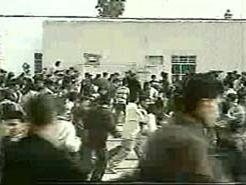
LCN
Des centaines d'Irakiens sans emploi ont manifesté samedi pour une
deuxième journée consécutive dans la ville d'Amarah. La manifestation a
cepndant dégénéré et six Irakiens ont été tués lors d'affrontements avec
les soldats britanniques et la police irakienne.
Les
protestataires ont lancé des grenades assourdissantes vers les forces de
l'ordre, qui ont répliqué en ouvrant le feu sur la foule. Onze personnes ont
été blessées.
Des soldats
anti-émeute ont été déployés aujourd'hui autour du complexe abritant le
bureau du maire d'Amarah et le siège de la coalition. On ne rapporte aucun
incident déplorable.
http://www.news-journal.com/news/content/news/ap_story.html/Intl/AP.V5439.AP-Iraq.html;COXnetJSessionID=AFPYKBeMy6iXE1yaiDkzagWU1PEjOC1OVqbGmBAyY0m1D79WlBVs!-1522714230?urac=n&urvf=10741062641880.18083853815439932
Iraqis Resume
Violent Protests for Jobs
By NADIA ABOU EL-MAGD
Associated Press Writer
AMARAH, Iraq (AP)--Hundreds of Iraqis hurled stones at
baton-wielding British soldiers Sunday in the southeastern city of
Screaming protesters, some armed with sticks and
shovels, attacked in waves throughout the day, trying to rush troops guarding
the city hall. The British drove the crowd back from the compound, which also
houses the U.S.-led occupation force and the 1st Battalion of Britain's Light
Infantry.
Booms and flashes of light exploded in the crowd,
believed to be from homemade bombs of tin cans packed with explosives and nails
and lit with candlewicks.
Soldiers blocked roads and periodically pushed
demonstrators back, sometimes with batons, sometimes marching in unison behind
riot shields and, against younger protesters, simply shoving them with their
hands.
``Yesterday there were more adults with much more
violent intent,'' said British Maj. Johnny Bowron. We are trying to permit a
peaceful protest but prevent loss of life or damage to property.''
Officials said they were demanding jobs in a city of 400,000 where the
biggest employer was the security force of Saddam Hussein until the U.S.-led
invastion ousted his dictatorial regime.
Elsewhere,
Acting on a neighbor's tip, soldiers arrested the man
in an early morning raid on his home in Tikrit, according to Lt. Col. Steve
Russell, commander of the 1st Battalion, 22nd Infantry Regiment of the U.S.
Army's Texas-based 4th Infantry Division.
The soldier allegedly shot by the Iraqi, Sgt. Jeffrey
Allen of
Allen was shot twice in the back on Dec. 30 during a
patrol in Tikrit but was saved by a protective plate in his flak jacket, Russell
said.
In the northern city of
Two other explosions blasted near the U.S.-led
coalition office in the northern oil city of
Also Sunday, authorities said the body of an Iraqi
working with the U.S.-led coalition was found in the southern city of
In
Tensions in Amarah,
They stoned the town hall, shattering windows. Shots
rang out, makeshift bombs were thrown and the British and Iraqi police opened
fire. Hospital officials said six people were killed. The British put the death
toll at five--with no casualties among soldiers or police.
On Sunday, demonstrators sent a representative to talk
to British and Iraqi officials, who promised them 8,000 jobs, according to
witnesses. But protesters said a similar promise made weeks before had not been
fulfilled and the clash ensued. No Iraqi police were visible at the scene
Sunday.
On Saturday, the Danish military said its engineering
troops and Icelandic de-miners found artillery shells near Quarnah, north of
The shells were sent for further testing to determine
if they contained chemical weapons, banned in
Before the war, the
Lack of evidence in a nine-months search since then has
led critics to suggest the Bush administration either mishandled or exaggerated
its knowledge of
Saddam's regime used chemical weapons against Iranian
soldiers and killed an estimated 5,000 Kurdish civilians in a chemical attack on
the northern city of
AP-NY-01-11-04 1009EST
Copyright 2004, The Associated Press. The information
contained in the AP Online news report may not be published, broadcast or
redistributed without the prior written authority of The Associated Press.
http://electroniciraq.net/news/printer1325.shtml
electronicIraq.net
Protests in
Ewa Jasiewicz, Occupation Watch
12 January 2004
Today saw thousands of former soldiers riot in the streets of
Approximately 2000 ex-service men amassed in the streets of Ashaar, a crowded
market, hawker-mafia district, with sellers and junk stalls flanking a filthy
river, and the home of the Raffidian Bank, aka pay-out HQ. Today was Iraqi Army
Day - the annual celebration of over 80 years of soldiering and saluting to the
beat of many a monarchy, authoritarian, general coup fought and dictatorship
drum. For the thousands of ex-service men laid off in May and demonstrating
outside CPA South HQ on a weekly basis, today had a deeper significance. It was
also the deadline for their 10-day pay-or-face-our-organized-wrath vow over 3
months of financial destitution courtesy of CPA indifference.
The back payments amount to $150 per person. The ex-soldiers are also demanding
a permanent monthly payout of $50 per month and not the $15 I was quoted by
demonstrators outside CPA HQ almost 2 weeks ago. A protestor beaten into a
hospital bed by British troops told me tonight that maybe I was quoted that
figure by an outsider and to take care from stuff like that, whilst his brother
by his side chuckled ruefully and said $15? What, so we can buy a pack of
cigarettes?, followed by a more serious appraisal of, 'Remember that many people
don't know the actual exchange rate of the dollar'. Either way, the payment of
such figures by the Occupation Administration represents a threat to its budget,
currently following a military construction and entrenchment agenda (the only
reconstruction that's taken place in the south has either been workers' own or
Occupation entrenching military base and prison camp building). Benefits
payments also threaten the control-at-the-lowest-costs basic principles of
occupying, which the almost total absence of humanitarian/social construction,
and extermination of almost all previous state survival benefits plus cheap gear
for soldiers - worst machine guns on the market according to a former military
Special Ops acquaintance here and shared bulletproof vests - all attest to.
Official figures put the population of the Iraqi army at 350,000, but compulsory
conscription, CPA created unemployment downplaying and the word of locals
estimates its pre-war levels at 2 million. Islam on-Line quotes a figure of five
million when the dissolution information, interior ministries, and defense
ministries are taken into account.
Now, in
The demonstration began at approximately 8 am, on a muggy smoggy
Hassan, 36, was near the front of the demo when the firing began. A soldier
since he was 14-years-old, I met him in
Hassan was suffering from internal bruising to his kidneys after being kicked by
2 truckloads of Iraqi coppers (11 or so) and 6 British Soldiers. He recounts his
version of the day s events:
“When we arrived at the bank we immediately started to demand our payment. The
Police responded by locking up the bank. There were no British troops present at
this point. The Police then came forward and started to beat and push us. Some
also started firing. The protest took place in the middle of a triangle of
banks. Guards started firing in all directions. Then they called the British. I
saw four people injured before me and one person was definitely killed. He was
shot in the back of the head, in front of me. He was around my age 35, 36. I saw
another injured in the calf, another just above the knee and another I don’t
know as the bullet came from the direction of another bank.
The crowd moved the injured into their cars and took them to the hospital.
When the Brits arrived, they came with 8 tanks and about 7 jeeps and surrounded
the whole area. The police were still around at the time. We ran when we heard
they were coming but we came back after ten minutes with sticks and rocks.
The British arrested two people but released them later after they pushed them
back from the bank. A group of soldiers tried to arrest a group of us but we
attacked them. One group managed to grab one British soldier and dragged him
into the crowd, which then beat him with rocks. Not throwing rocks at him but
actually beating him with our rocks. Four more came running at us with sticks
after this but we beat them all too with our own sticks and rocks. Even a
soldier sitting in his tank put down his hatch and hid. We were throwing stones
so hard that no one could even get close enough or shoot their guns. The British
moved their tanks into the crowd to rescue the soldier kidnapped into the crowd
and managed to carry him into the tank.
I saw three soldiers injured directly - one in the head, one in the leg his -
knee was broken by a rock, and one in the back.
I remember one officer coming out of his tank and trying to calm us down,
speaking to us like they were on our side and like they felt sorry for us. The
translator came up and asked us for our demands. We told him all we wanted was
our pay and that, 'Today is just a slight thing; if we don’t get our wages
then we’ll become like Osama Bin Laden, and tomorrow we’ll be back even
stronger.'
When the Special Operations Police came up and told us to leave, we said, 'You
are so young! We were out fighting before your mother even met your father. We
are soldiers, we will show you what you’re made of'.
'I did witness some people trying to sabotage the demonstration. When we were
trying to negotiate with the Brits they threw stones on both of us and then they
tried to enter the bank while we were negotiating. We said, we want our pay,
that’s all, we don't want to break into it and loot it. They tried to break
into the market too. We soon grabbed them and threw them out'.
Remember how much we did hate Saddam Hussein? He was dirty and selfish but the
British came up with their sweet talks of freedom, democracy and human rights
but where is it? Where is it?”
One of
When myself and a friend walked into the demo at around midday, with British
troops mobbing up with plastic foot length shields and shin pads and some eating
what looked like fish and chips on the sidelines, the action was almost over.
Tanks stood parked in the triangle of banks. Bricks and smashed up bits of
pavement lay broken on the ground. Huddles of veterans were standing around,
jaws clenched. Upon spotting us they soon formed a tight circle around us and
the only thing that saved me from potentially being stoned to a pulp, explained
my friend, was the fact that some of the protestors recognized me from the
previous demo and were able to vouch for me. This didn't stop exhausted wails of
'WE'RE NOT TERRORISTS!!! AL JAZEERA ARE LIARS, ALL JOURNALISTS ARE LIARS!,’
voiced in my direction. One of the unelected and much reviled negotiators surged
up behind me and attempted to smash my head open with a large brick, whist
denouncing me for being with 'AL JAZEERAAAA!' I had to leave, fast, pursued by a
confused crowd, with my friend. When asked if he too was a foreigner, tersely
replying he was 'A son of
Jawazees
Both the injured soldier plus three others told me that the negotiators
advocating on their behalf were collaborators and have since been employed by
the British. 'We suffered a lot from the people who negotiated with the people
in the palace.' tells me Basim, who has sacrificed 20 years of his life to the
army. 'The result was that they were employed by the British'. Hassan also
confirmed that many regarded them as having been paid off and when this
demonstration took place, the two were absent. 'If we see them again, we will
kill them. We will tear them apart', swears Basim. Asked what process was
undertaken to chose these negotiators, Hassan explained from his hospital bed,
'They weren't elected. We were searching for someone to come and talk to them
who can speak English, so we saw him (one of the negotiators) trying to talk to
the British in English so he then said he'd go in on our behalf. Even the people
who went inside today were not elected. Our people are simple, not educated and
we trust people fast, after all they are soldiers just like us'.
Negotiations at the riot eventually took place out in the open air on top of a
tank. 'In public because we didn't trust anyone' said Hassan. 'The British said
we are going to the palace and we'll bring you your money. Please form a queue.
We waited one hour for them and they didn't return. At this point I was in so
much pain from my injuries that I had to leave'.
Basim, Mazen and Ali, the three vets I spoke to on the river are adamant that if
money isn't paid out to the thousands of unemployed servicemen soon, the British
will be facing more than flying rocks, bottles and burning tires. Asked if the
situation is reaching a point where most people will start wanting the British
to leave Basim says, 'Yes, of course. When the British came to
Following Wednesday's riot, despite unemployed ex-service men turning up at
Ashaar with a stack of tires under the bridge and alleged hidden kalashnikovs,
all was placid and the veterans queued in the pouring rain and read soggy DHSS
style Coalition leaflets informing them that they had to go to the bank they
were originally registered with and check if their names were written down. If
not, then they had to re-apply. All those with their names scribed in the lists
received $150 - 3 months back payment.
The story doesn't end there or in
Adam Price MP explains in his excellent 'Can Kill, Won't Count' report into
civilian deaths at the hands of the British Occupation, the responsibilities of
the occupying authority to conduct investigations into any killings perpetrated
by security forces on the territory. The case of Kaya vs.Turkey 1998 saw the
Court rule that 'neither the prevalence of violent armed clashes nor the high
incidence of fatalities can displace the obligation under Article 2 to ensure
that an effective, independent investigation is conducted into deaths arising
out of clashes involving the security forces, more so in cases such as the
present where the circumstances are in many respects unclear.'
Despite demonstrations today, yesterday, last week and six months ago all
qualifying as riots, the use of live ammunition as crowd-control can't be
justified unless an immediate and usually armed threat is presented. The
immediate and indiscriminate resort to lethal force, as demonstrated in Basra
and Amara can also seen as a violation of the UN's Basic Principles of the Use
of Force and Firearms by Law Enforcement Officials. The Basic Principles, seen
as the gold standard in international policing but holding no legal weight in
terms of prosecution in the event of derogation, provide that the intentional
lethal use of firearms may only be made:
'When strictly unavoidable in order to protect life' (Principle 9), and that
'law enforcement officers should as far as possible apply non-violent means
before resorting to the use of force and firearms (Principle 4).' Exceptional
circumstances such as internal instability or other public emergency may not be
invoked to justify a departure from these basic principles.
The next few weeks will reveal the level of commitment the Occupation
Administration has towards its obligation under the
http://radio-canada.ca/nouvelles/International/nouvelles/200401/11/003-MANIFIRAK.shtml
Nouvelle
manifestation en Irak
Mise
à jour le dimanche 11 janvier 2004 à 10 h 20
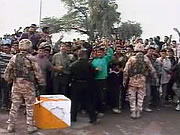
Pour
une deuxième journée consécutive, une foule d'Irakiens a manifesté devant le
siège du gouvernement local à Amara, dans le sud du pays, afin de réclamer
des emplois.
La veille, six manifestants avaient été abattus et 11 blessés par la police
irakienne et des soldats britanniques, lors d'un premier rassemblement de
chômeurs réclamant des emplois.
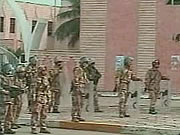
Selon
le chef de service de sécurité de l'hôpital général d'Amara, la
manifestation de chômeurs a commencé à dégénérer lorsque certains d'entre
eux ont lancé des grenades détonantes en direction des forces de l'ordre.
Les régions chiites pauvres du sud sont particulièrement touchées par le
chômage qui s'est aggravé après la chute du régime de Saddam Hussein.
Dimanche, une dizaine de soldats britanniques en tenue anti-émeutes
protégeaient le complexe abritant le bureau du maire, le siège de la coalition
et un bataillon britannique.
Dimanche, à Mossoul, dans le nord du pays, quatre obus de mortier ont explosé
contre les locaux de l'Union patriotique du Kurdistan. Personne n'a été
blessé.
À Takrit, des soldats américains ont arrêté une fidèle de Saddam Hussein
dimanche matin. Il était recherché dans le cadre de l'enquête sur une
fusillade qui avait failli coûter la vie le mois dernier à un soldat
américain, selon l'armée américaine. Le militaire avait été sauvé par son
gilet pare-balles.
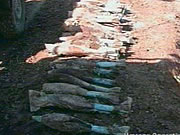
Par
ailleurs, des soldats danois ont découvert près de Bassorah des dizaines
d'obus qui pourraient contenir un gaz toxique de type moutarde.
Selon l'armée danoise, les 36 obus étaient enterrés depuis plus de 10 ans. Un
porte-parole de l'armée américaine a déclaré qu'il s'agissait probablement
de vestiges de la guerre qui a opposé l'Irak à l'Iran, de 1980 à 1988.
Statut de Kirkouk
À Bagdad, l'administrateur américain Paul Bremer a repoussé à 2005 la
détermination finale du statut de la ville pétrolière de Kirkouk, qui est
revendiquée par les Kurdes. Selon M. Bremer, le statut de Kirkouk doit être
décidé par des Irakiens élus.
L'accord de transfert des pouvoirs, signé le 15 novembre par le Conseil de
gouvernement transitoire et l'Autorité provisoire de la coalition (CPA),
prévoit des élections d'une assemblée constituante au plus tard le 15 mars
2005.
En décembre dernier, les chefs kurdes Jalal Talabani et Massoud Barzani ont
ouvertement revendiqué cette ville du nord de l'Irak pour des raisons
historiques. Ces déclarations ont provoqué de vives réactions des partis
arabes et des heurts sanglants entre Arabes, Turcomans et Kurdes.
Le Blackhawk victime d'une attaque
Par ailleurs, l'hélicoptère
américain qui s'est écrasé jeudi, à l'ouest de Bagdad, aurait bel et bien
été la cible de tirs ennemis. Neuf soldats ont perdu la vie au cours de cette
attaque survenue près de Falloujah, un des bastions de l'oppposition à
l'occupation américaine en Irak.
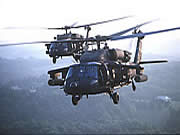
Des
hélicoptères militaires UH-60 Blackhawk (Archives)
Selon un porte-parole de l'armée américaine, l'écrasement s'est produit alors
que le pilote de l'appareil Blackhawk tentait de faire un atterrissage d'urgence
après avoir été endommagé par des tirs hostiles.
Écouter le reportage de Roger Auque
http://servihoo.com/channels/kinews/v3news_details.php?id=29009&CategoryID=49
Irak:
la "débaassification" s'amplifie, colère à Amara
[11
Jan 2004]
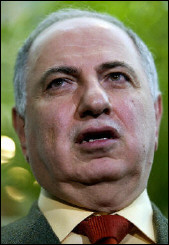
BAGDAD (AFP)
L'exécutif
provisoire irakien a annoncé dimanche un élargissement du processus de
"débaassification" alors que les habitants d'Amara, dans le sud
chiite, exprimaient leur colère après les heurts meurtriers de la veille entre
chômeurs et forces de l'ordre.
Dans
la ville sainte de Najaf (centre), le grand ayatollah Ali Sistani, le plus
influent des chefs religieux chiites, a insisté sur des élections générales,
estimant qu'une Assemblée provisoire non élue ne pouvait pas
"représenter les Irakiens de manière idéale".
Le
président du comité d'éradication du Baas, parti panarabe du chef de l'Etat
déchu Saddam Hussein, Ahmad Chalabi, a assuré que l'élimination des
responsables baassistes des rouages de l'Etat était une "condition
préalable à la restauration d'une vie normale en Irak".
Quelque
28.000 hauts responsables baassistes ont déjà été écartés de
l'administration, et un nombre équivalent devrait être concerné par ces
mesures, selon M. Chalabi, qui veut élargir le processus.
"Ces
mesures s'appliquent au secteur public, mais le comité publiera prochainement
des instructions similaires pour le secteur privé et les associations
professionnelles", a déclaré le président du Congrès national irakien
(CNI) et membre du Conseil de gouvernement transitoire.
Les
nouvelles instructions doivent conduire, à quelques exceptions près, à
licencier les membres de la haute et moyenne hiérarchie du Baas, sans
inquiéter les membres de base de ce parti qui exerçait un contrôle sans
faille sur l'ensemble de la société irakienne.
A
Amara, à
Les
militaires britanniques gardant le siège du gouvernorat de la ville, chef-lieu
de la province de Missane, ont chargé les manifestants, au nombre de 150 à
200, à la mi-journée et dispersé la foule.
Une
autre manifestation s'est formée plus tard pour marcher sur le siège de la
brigade anti-émeutes, dont des membres ont tiré en l'air pour disperser la
foule et interpellé deux manifestants.
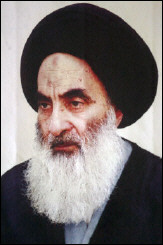 Lors
du premier rassemblement, les manifestants ont distribué un communiqué
demandant notamment "l'arrestation des auteurs des tirs meurtriers" de
la veille et "l'élection d'un nouveau gouverneur", estimant que
l'actuel ne faisait rien pour juguler le chômage, qui n'a cessé d'augmenter
depuis la chute de l'ancien régime, il y plus de neuf mois.
Lors
du premier rassemblement, les manifestants ont distribué un communiqué
demandant notamment "l'arrestation des auteurs des tirs meurtriers" de
la veille et "l'élection d'un nouveau gouverneur", estimant que
l'actuel ne faisait rien pour juguler le chômage, qui n'a cessé d'augmenter
depuis la chute de l'ancien régime, il y plus de neuf mois.
Toujours
dans la zone d'occupation britannique du sud chiite, un Irakien résident aux
Etats-Unis et travaillant pour la coalition a été tué samedi en compagnie
d'un de ses amis, à Bassorah, a annoncé celle-ci.
Pour
le grand ayatollah Sistani, l'Assemblée provisoire, prévue par l'accord de
passation de pouvoirs, signé le 15 novembre entre le Conseil de gouvernement et
la coalition dirigée par les Etats-Unis, n'aurait "aucune
légitimité".
"De
même la loi fondamentale (provisoire) et les accords de sécurité (éventuels
avec les Etats-Unis) doivent être soumis aux représentants élus du peuple
pour avoir de la légitimité", a-t-il ajouté, après avoir rencontré le
président du Conseil de gouvernement, le sunnite Adnane Pachachi.
Par
ailleurs, l'armée américaine a annoncé avoir découvert au nord de Bagdad une
cache d'armes contenant notamment 400 roquettes et obus de mortier ainsi que 260
roquettes anti-char et 42 lanceurs, 16 caisses d'explosifs "confectionnés
de façon artisanale" et neuf obus de
Le
Pentagone a annoncé que 504 soldats américains avaient été tués, près de
dix mois après l'invasion du pays par les troupes américano-britanniques.
Depuis le 1er mai, date à laquelle le
président George W. Bush a déclaré la fin des opérations de combat majeures
en Irak, 366 soldats américains ont trouvé la mort, 237 dans des combats et
129 dans d'autres circonstances.
http://radio-canada.ca/nouvelles/International/nouvelles/200401/12/005-Irak-Lundi.shtml
Nouvelles
violences en Irak
Mise
à jour le lundi 12 janvier 2004 à 10 h 40

Un
soldat américain a été tué et deux autres ont été blessés dans
l'explosion d'un engin artisanal lundi à Bagdad, a annoncé un porte-parole
militaire américain.
Par ailleurs, l'armée américaine annonce avoir tué dimanche sept Irakiens qui
volaient du carburant d'un oléoduc dans la région sunnite de Samarra, au nord
de la capitale.
L'armée précise que les soldats américains se sont retrouvés en face d'une
quarantaine d'hommes armés de kalachnikov qui se sont mis à tirer.
Manifestation de chômeurs en Irak
Dimanche, une foule d'Irakiens a manifesté devant le siège du gouvernement
local à Amara, dans le sud du pays, afin de réclamer des emplois.
La veille, six manifestants avaient été abattus et 11 blessés par la police
irakienne et des soldats britanniques, lors d'un premier rassemblement de
chômeurs réclamant des emplois.

Selon
le chef de service de sécurité de l'hôpital général d'Amara, la
manifestation de chômeurs a commencé à dégénérer lorsque certains d'entre
eux ont lancé des grenades détonantes en direction des forces de l'ordre.
Les régions chiites pauvres du sud sont particulièrement touchées par le
chômage qui s'est aggravé après la chute du régime de Saddam Hussein.
Dimanche, une dizaine de soldats britanniques en tenue anti-émeutes
protégeaient le complexe abritant le bureau du maire, le siège de la coalition
et un bataillon britannique.
À Mossoul, dans le nord du pays, quatre obus de mortier ont explosé contre les
locaux de l'Union patriotique du Kurdistan. Personne n'a été blessé.
À Takrit, des soldats américains ont arrêté une fidèle de Saddam Hussein
dimanche matin. Il était recherché dans le cadre de l'enquête sur une
fusillade qui avait failli coûter la vie le mois dernier à un soldat
américain, selon l'armée américaine. Le militaire avait été sauvé par son
gilet pare-balles.

Par ailleurs, des soldats danois ont
découvert près de Bassorah des dizaines d'obus qui pourraient contenir un gaz
toxique de type moutarde.
Selon l'armée danoise, les 36 obus étaient enterrés depuis plus de 10 ans. Un
porte-parole de l'armée américaine a déclaré qu'il s'agissait probablement
de vestiges de la guerre qui a opposé l'Irak à l'Iran, de 1980 à 1988.
Écouter le reportage de Roger Auque
http://www.boston.com/dailynews/012/world/Shiite_Muslim_riot_reflects_gr:.shtml
By Nadia Abou El-Magd,
Associated Press, 1/12/2004 14:00KUT, Iraq (AP) Ukrainian soldiers fired into
the air Monday to disperse hundreds of Iraqis who rioted for jobs and food as a
second southern Shiite Muslim city was rocked by unrest a barometer of rising
frustration with the U.S. led-occupation in a region of Iraq considered friendly
to the Americans.
Also Monday, the
Trouble started in Kut,
The Ukrainians then fired
in the air to disperse the crowd, injuring one protester, Wedad said. He said
the demonstrators hurled bricks at the building and trashed a post office in the
city.
In a similar protest in
Amarah on Sunday, waves of protesters rushed British troops guarding the city
hall before being pushed back. On Saturday, clashes in Amarah killed six
protesters and wounded at least 11.
Unrest in the Shiite areas
has spread as the country's leading Shiite cleric, Grand Ayatollah Ali
al-Husseini al-Sistani, has spoken out against the U.S.-backed formula for
transferring power to the Iraqis.
In a full-page newspaper
advertisement Monday, al-Sistani repeated his demand that a proposed provisional
legislature be elected rather than chosen by regional committees as called for
under a plan endorsed by the U.S.-led coalition and the Iraqi Governing Council.
Al-Sistani is highly
influential among
No details were available
about the death in
Still,
Also Monday, another
roadside bomb exploded near an Army convoy in Ramadi, a town west of
On Friday,
It said the Iraqi led the
troops to a house, where they found dozens of rocket-propelled grenades and a
handful of launchers, nearly
Also acting on an Iraqi
tip, U.S. soldiers shot dead of the estimated 40 members of an armed gang
allegedly trying to steal oil from a pipeline south of Samarra,
Meanwhile, the Danish army
said Monday that results of a new series of tests to determine whether 36 shells
buried in the southern Iraqi desert contain a liquid blister agent could be
expected by the end of the week. The shells, thought to be left over from the
1980-88 Iran-Iraq war, were uncovered last week by Danish and Icelandic troops.
Separately, the top
''In a unified
Associated Press writer
Paul Garwood in Tikrit contributed to this report.
http://www.belleville.com/mld/newsdemocrat/7694376.htm
Posted on Tue, Jan. 13, 2004
![]()
Crew
OK as
Associated
Press
And in Fallujah, also west of
The AH-64 helicopter gunship from the 3rd
Armored Cavalry Regiment crashed near the town of
"It was apparently downed by enemy
fire," he said. The gunship was providing aerial security for a ground
convoy moving in the area, the U.S. Central Command said.
In the same area, a medevac helicopter was
downed Jan. 6, killing nine
Following the demonstration in Fallujah,
gunmen fired rocket-propelled grenades at
The dead included a 33-year-old woman shot
in the home of her sister, and Ahmed Naji, 37, whose car crashed in a hail of
gunfire. Naji's brother and father were seriously wounded, police Capt. Taha
al-Falahi said.
"Our rights are gone and lost. See how
beautiful democracy is. They take the women away. They kill the youth. We are
living in luxury," Naji's cousin Khalil Ibrahim said.
Also Tuesday, Ukrainian troops opened fire
to disperse several hundred protesters demanding jobs in Kut,
In
"The Americans have ruined an innocent
family, children and women," said Wijdan Abdel Wahab. "They didn't
even bother to look back at them after shooting."
Officials of the 1st Armored Division, in
charge of security in
The military was also investigating another
apparent shooting of civilians by Americans - four Iraqis, including a
7-year-old boy, killed in a taxi near Tikrit on Jan.
The incidents reflect the difficulties
faced by
For example, the detention of the
17-year-old woman sparked outrage in Fallujah. Residents there, like many in the
so-called "Sunni Triangle," are religious conservatives and equate a
woman's dignity with family honor.
Relatives said the woman, who was married
six days ago, was alone at home Monday when
Maher Turki, her brother-in-law, said the
soldiers were looking for another of his brothers in the hope he would lead them
to Khamis Sarhan, leader of Saddam's Baath party in Fallujah. Turki said his
brother was acquainted with Sarhan but was not an associate.
"In all honesty, she was treated well.
They only had women soldiers deal with her. They did not harm her. They didn't
touch one hair on her head," Turki said.
While anti-U.S. sentiments have been
widespread in Sunni areas, occupation authorities also face anger in southern
Shiite towns over hardships that persist nine months after Saddam's regime
collapsed. Shiites are a majority in
Unrest among Shiites may be linked to
criticism from their spiritual leader, Grand Ayatollah Ali al-Husseini
al-Sistani, about a U.S.-backed formula for transferring power to the Iraqis. He
says a provisional national assembly must be elected directly, not selected from
regional caucuses as provided for in a Nov. 15 accord.
(Associated Press reporters Jim Krane and Nadia Abou El-Magd in
http://www.albawaba.com/news/index.php3?sid=267921&lang=e&dir=news
www.albawaba.com
January 13, 2004
At least seven Iraqis wounded during job protest, two Iraqis killed in
firefight
At least seven Iraqis were injured when a
protest against unemployment in southern
In southern city of
"Seven wounded were admitted to the emergency room -- five protestors and
two female bystanders," said Dr. Taha ali Abdul Hussein. Six suffered
bullet wounds, including one of the women.
On Monday a similar riot in Kut, some
Four Iraqi policemen, a Ukrainian soldier and a demonstrator were wounded on
Monday. It all began when around 400 protesters marched on a government building
to demand jobs. The demonstrators reportedly threw bricks at the building and
trashed a post office, Wedad said.
Kut was the second Shiite Muslim city, which was hit by job riots, stressing
mounting anger among Iraqi people about the difficulties they face under
Meanwhile, an Iraqi Civil Defence Corps soldier and an alleged attacker were
killed in a firefight after security officials found a weapons cache in a
vegetable truck, the US Army said, according to AFP.
"As the ICDC were securing the contraband the drivers threw a
grenade," killing the ICDC man and slightly wounding another one Monday in
Tarmiyah, west of
www.albawaba.com
© Copyright Al-Bawaba.Com 2004
http://www.washingtonpost.com/wp-dyn/articles/A14292-2004Jan13.html
Clashes Rise in
Jobless Protesters Confront Ukrainian Troops and Local
Police
By Pamela Constable
Wednesday, January 14, 2004; Page A14
KUT,
Angry demonstrators confronted Ukrainian army tanks and Iraqi police at
City Hall plaza for the second day in a row. A block away, Ali Aziz,
"I have three children to support, we are living in one rented room
and I have to hold up a bucket to the ceiling when it rains," he said.
"I helped protect the city offices during the war, but now the old thieves
are back inside, and they only give jobs to their friends." The protesters
were "out there to defend all our rights," he said.
Officials and witnesses said at least a dozen civilians and police were
injured Tuesday, the fifth day of anti-government protests since Jan.
The southern Shiites were systematically repressed during the
dictatorship of Saddam Hussein, and until recently they largely supported the
U.S.-led invasion and the appointed interim government. But in the past week,
protests have broken out in the cities of Kut, Amarah and
There were also several violent incidents in the capital Tuesday. After a
roadside bomb blew up an Army vehicle, killing one soldier,
The southern demonstrations coincided with a growing split between
By most accounts, Tuesday's protests in Kut were sparked by local and
personal grievances. The crowd of about 1,000 demonstrators, who tried to storm
City Hall and break into a bank, included recently dismissed soldiers and
laborers who have long been jobless. Their wrath was directed largely at local
and regional officials who they said demanded bribes or were former members of
Hussein's Baath Party.
"I was a policeman before the war. When I went back to rejoin my
station, they said I had to pay $150. Every single department is asking for
bribes, and they are all followers of Saddam," complained Mohammed Ali, 23,
whose head was wrapped in a bandage after two days of confronting the security
forces. "People have gone without jobs for a year, and they are ready to
tear down buildings."
Some Kut residents asserted the protests were instigated by extremist
Shiite groups who had access to grenades and dynamite, which were thrown at
Ukrainian occupation troops on Monday and Tuesday. But the protesters insisted
that no political or religious group was behind them.
As the mob grew increasingly aggressive Tuesday, surging toward
government buildings and setting off explosions, a local Shiite cleric, Laith
Rubaie, intervened at the request of Iraqi police. At about 1 p.m., Rubaie
called for calm over a loudspeaker and drew the demonstrators toward his
downtown mosque for prayers.
"We are with you, we are beside you, we will demand jobs for you,
but please don't use grenades and weapons. . . . You are frightening the women
and children," Rubaie called over the din of agitated, argumentative
voices. He said he agreed with the crowd that some police were "corrupt
Baathists," but he said others were "caught in the middle. They don't
want to shoot our own people."
Throughout the day, Iraqi police fanned out across the city, with
pistol-brandishing agents careering around corners in unmarked cars and riflemen
darting from block to block with their faces hidden by scarves.
Ukrainian occupation troops sat in tanks surrounding City Hall and lay on
nearby rooftops with rifles.
Police said a half-dozen officers had been wounded during the two days of
demonstrations, and protesters said they had taken several wounded friends or
bystanders to hospitals, including a schoolgirl they said was shot in the leg
Tuesday.
Many residents -- including doctors, school principals and police
officers in riot gear -- said they were concerned about the violence but also
sympathized with the protesters. They said the combination of high unemployment
and widespread official corruption had driven many people to despair.
Some people complained that occupation authorities had been slow to
deliver promised jobs and services, but most blamed Iraqi officials, including
both former Baath Party members who managed to retain niches in the bureaucracy
and former exiles who were appointed to national and regional posts by
Although calm had been restored by mid-afternoon, the city remained tense
and residents said that violence could easily flare again if authorities did not
respond to the need for jobs. Aides to Rubaie said he had spoken with provincial
officials and then promised the crowd a response to its demands within two days.
"The Shiite people are peaceful and dignified, but when their rights
are stolen, no foreign troops can stop them," said Abdul Karim Mustafa,
http://www.ouest-france.fr/ofetranger.asp?idDOC=116463&idCLA=3637
Etranger
La
majorité chiite est en train de basculer dans l'antiaméricanisme
Irak :
les émeutes minent l'ordre US
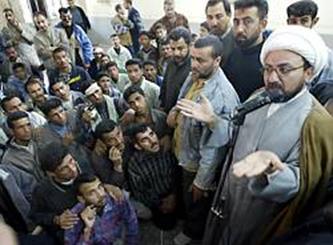
Des soldats ukrainiens ont tiré, hier,
à Kout, sur des chômeurs qui attaquaient la préfecture à la grenade. Après
l'affrontement, qui a fait 7 blessés, un religieux chiite calme les
manifestants.AFP
Les
émeutes font tache d'huile dans le sud de l'Irak, fief de la majorité chiite.
Les Kurdes du Nord exigent une quasi indépendance. Les sunnites virent à
l'islamisme. Pour le chercheur Pierre-Jean Luizard (1), qui s'est rendu en Irak
à cinq reprises depuis la guerre, la reconstruction américaine est mal en
point.
Six morts à Amara
samedi, sept blessés à Kout hier. Les manifestations se multiplient dans le
sud chiite de l'Irak. Pourquoi ?
Il
y a des manifestations contre le chômage depuis juillet, parfois meurtrières.
Simplement, on n'entendait pas parler de villes comme Kout ou Amara parce que
les soldats de la coalition ne stationnent pas à l'intérieur de ces
localités. Le pouvoir y a été remis à des notables, liés aux partis
politiques chiites engagés dans le conseil de gouvernement transitoire. Leur
clientélisme, la dissolution de l'armée, l'effondrement de l'économie, les
mafias qui prospèrent... tout cela alimente une exaspération sociale.
La communauté chiite
52 à 55 % des Irakiens était pourtant restée paisible depuis
le début de l'intervention américaine...
Pour
la première fois dans l'histoire de l'Irak, les religieux de Nadjaf (sud)
le Vatican chiite n'ont pas appelé à prendre les armes contre
une invasion occidentale. Les chiites étaient arrivés à la conclusion que
seul l'Occident, qui avait maintenu Saddam Hussein au pouvoir jusqu'en 2002,
était à même de le renverser. Lorsque les Américains se sont installés, il
y a eu l'ivresse de la libération : pour la première fois depuis 1977,
les chiites ont pu se rendre en pèlerinage dans leurs lieux saints de Nadjaf et
Kerbala... L'administrateur Paul Bremer a intégré au gouvernement provisoire
les partis chiites rentrés d'exil, leur distribuant les plus belles villas des
dignitaires de l'ancien régime, des téléphones portables... Pour la
communauté chiite, qui avait toujours été exclue du pouvoir, c'était
tentant.
La lune de miel est
terminée ?
Ces
partis sont vite devenus des réseaux de clientélisme, comme l'était le Baas
sous Saddam. Ils se comportent comme une nouvelle nomenklatura, se sont
ghettoïsés. Il suffit de voir leurs dirigeants à Bagdad. Ils vivent
barricadés... comme les Américains ! Ils ont perdu leur base. La
population s'est retournée. Aujourd'hui, un nom est sur toutes les
lèvres : Moqtada Sadr, jeune fils d'un ayatollah chiite assassiné en
Qui peut, désormais,
parler au nom de la majorité chiite d'Irak ?
L'ayatollah
Sistani, la plus haute autorité religieuse, est sorti de sa ligne
« quiétiste », autrement dit de non-intervention sur le terrain
politique. Dans l'urgence. Pour ne pas laisser s'installer le vide et le chaos.
Il réclame la tenue rapide d'élections au suffrage universel, selon le
principe « une personne = un vote » et, ensuite seulement, le
transfert de souveraineté aux Irakiens. Autrement dit : le pouvoir à la
majorité arabe chiite et pas de gouvernement nommé par les Américains. Tout
le contraire du plan de Paul Bremer. Par son aura, l'ayatollah Sistani détient
les clés de l'avenir.
La reconstruction
échafaudée par les Américains est menacée ?
La
logique communautariste des Américains, qui s'appuient sur les chiites et les
Kurdes, est un piège. Les Kurdes du nord (20% de la population) ne se sentent
plus : ils réclament leur drapeau, leur hymne, leur monnaie et veulent
faire de Kirkouk leur capitale, alors que les Turkmènes et les Arabes y sont
majoritaires. Exclus de la nouvelle donne, les Sunnites qui dirigeaient l'ancien
système se sont donnés aux islamistes : contrairement aux chiites et aux
kurdes, qui étaient coupés du monde, ils peuvent adosser leur guérilla au
grand ensemble sunnite. Cette guérilla empêche toute reconstruction, non
seulement politique, mais aussi économique.
(1)
Auteur de
Recueilli par
Bruno RIPOCHE.
http://news.independent.co.uk/world/middle_east/story.jsp?story=481721
16 January 2004
Tens of thousands of Shia Muslims marched through the streets of
The march, attended by 20,000 to 30,000 people, shows that Iraq's Shia
Muslims, some 60 per cent of the population, who were denied power by Saddam
Hussein, are increasingly fearful that they will be denied political power if a
new assembly is selected indirectly by caucuses. The Shias in the south of the
The issue has prompted several demonstrations and riots in southern
cities such as Amara and Kut, both on the Tigris between
In Kut, its streets filled with evil-smelling pools of muddy water after
recent rains, the authorities were taking no chances yesterday. Police armed
with sub-machine-guns had sealed of the mayor's office, the target of
protesters' anger in a riot earlier this week in which one man was killed and
three were wounded. Other men in leather jackets, also carrying Kalashnikovs,
were on every street corner.
In an effort to quell the anger of the unemployed, which describes most
of Kut's population, the authorities had organised a lottery inside a sports
stadium where 2,000 applicants were trying for 150 jobs in the border police.
Most of those waiting had been soldiers in the Iraqi army before it was
disbanded in May by the Coalition Provisional Authority in
A hard-faced police lieutenant named Mohammed Nasser, clutching his gun,
was quick to explain that the riots earlier in the week had been "organised
by foreigners, Syrians, probably, or members of al-Qa'ida, maybe Somalis".
This also turned out to be the official line from the mayor's office,
where Nia'ma Sultan Bash-Agha was holding court. The "troublemakers"
and "terrorists" had come from other parts of
Behind him on the wall was a picture by a local artist showing a snake,
representing Saddam, sitting on a pile of skulls and bones, being strangled by a
hand with the US and Iraqi flags draped over itsforearm.
Kut is a Shia town but the ex-soldiers were less interested in religion
than a desperate desire for employment. A soldier was sitting in a truck
guarding an enormous heap of job applications. Hamid Sasa, a graduate from the
Technology Institute in
Omar Hussein, a neatly dressed student who had studied to be an
electrician, said that there was another problem: "After the fall of Saddam
Hussein the opposition parties came here and have taken all the jobs. They ask
if Saddam murdered any of your relatives and if he did not they will not help
you."
He added that Dawa and the Supreme Council for the Islamic Revolution in
A problem for the
The Americans are distant in Kut; most Allied troops are from the
Ukrainian army. They are regarded with some contempt mixed with pity by local
people. Omar Hussein said: "They are really hopeless - even poorer than we
are. Anybody can bribe them with a cigarette. They send one patrol a night into
the city to show they are here, but otherwise they don't do anything."
There is no nostalgia for Saddam's rule in Kut, but it has become
conventional wisdom among the people of the city that they have fewer jobs and
their economic situation is worse than a year ago.